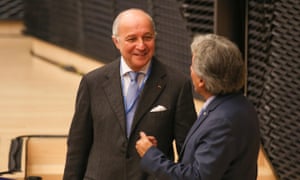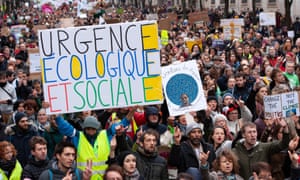Extract from The Guardian
Gilet jaunes protests cast shadow as concerns raised over backlash against rapid change
Scientists have laid down the gauntlet for political leaders as the
UN climate summit in Katowice, Poland, wrestles with the challenge of
cutting emissions without sparking social tensions like those seen
recently in France.
The UN climate talks – known as COP24 and the most important since the Paris agreement was signed in 2015 – aim to set a new rulebook for governments to reduce greenhouse gases and to raise ambitions, after warnings of dire consequences if global warming rises more than 1.5C above pre-industrial levels.
The climate crisis is already here and the risks are growing, said Hoesung Lee, chair of the UN Intergovernmental Panel on Climate Change, who led a study by thousands of scientists on ways to avoid 1.5C of warming via accelerated transition from fossil fuels.
“The IPCC made a tremendous collective effort to bring you the best scientific knowledge on the subject. We tell you limiting warming to 1.5C is possible but the window is narrowing,” Lee told a plenary on Tuesday. “The scientific community has delivered, now it is up to governments to take action.”
There has been fierce debate about what to do with the study. All but four of the world’s governments want to formally welcome the 1.5C report to spur a more ambitious shift towards renewable energy. However, four oil producing nations – the US, Russia, Saudi Arabia and Kuwait – said the study should merely be “noted”.
This issue has overshadowed the past few days of the talks in Poland.
Saudi Arabia has claimed there are “gaps and uncertainties” in the
study. The US held a long-planned event promoting coal, gas, oil and nuclear power.

The UN climate talks – known as COP24 and the most important since the Paris agreement was signed in 2015 – aim to set a new rulebook for governments to reduce greenhouse gases and to raise ambitions, after warnings of dire consequences if global warming rises more than 1.5C above pre-industrial levels.
The climate crisis is already here and the risks are growing, said Hoesung Lee, chair of the UN Intergovernmental Panel on Climate Change, who led a study by thousands of scientists on ways to avoid 1.5C of warming via accelerated transition from fossil fuels.
“The IPCC made a tremendous collective effort to bring you the best scientific knowledge on the subject. We tell you limiting warming to 1.5C is possible but the window is narrowing,” Lee told a plenary on Tuesday. “The scientific community has delivered, now it is up to governments to take action.”
There has been fierce debate about what to do with the study. All but four of the world’s governments want to formally welcome the 1.5C report to spur a more ambitious shift towards renewable energy. However, four oil producing nations – the US, Russia, Saudi Arabia and Kuwait – said the study should merely be “noted”.

He noted that global emissions rose by 2% this year, when they need to decline if warming is to be kept to a less dangerous level.
“Let us be clear, the real world is not on track. We need to do more and to do it faster,” Fabius said. “The IPCC 1.5C report shows the tremendous importance of every half degree and the disastrous consequences of missing that boundary.”
But many delegates said more attention should be focused on the social challenges of rapid change, as workers in old industries, such as coal, lose their jobs and the price of fossil fuels is pushed higher to stimulate the transition to alternative energies.
Without greater consideration of how the costs and benefits could be equally shared there could be a violent backlash, as France has experienced with the gilets jaunes protests that were initially about a planned rise in an eco-tax on petrol.
Jonathan Pershing, a former US climate envoy, said technology and the markets would drive change, and it was already cheaper to build a new renewable power plant than a new coal or gas plant.
“But you have to think about how to manage it. What happens to people who no longer have jobs from the old economy in the new economy? How do you think about new opportunities and the training you give young people? If you close down old facilities, how do you do it in a manner that keeps the communities alive and helps maintain the traditions and cultural structures?” Pershing said. “We don’t do it very often so we don’t have much experience. No report tells us how to manage the political difficulties. We need to manage the transitions. They’re hard.”
This was echoed by Andrew Steer, president of the World Resources Institute, who said it was important for governments to separate raising tax revenue from addressing climate change.
“The yellow vest implications are huge and show the danger if we take wrong moves,” he said. “We haven’t paid enough attention on the short-term impacts [of putting a price on carbon]. The environment movement needs to look at itself in the mirror.”

No comments:
Post a Comment